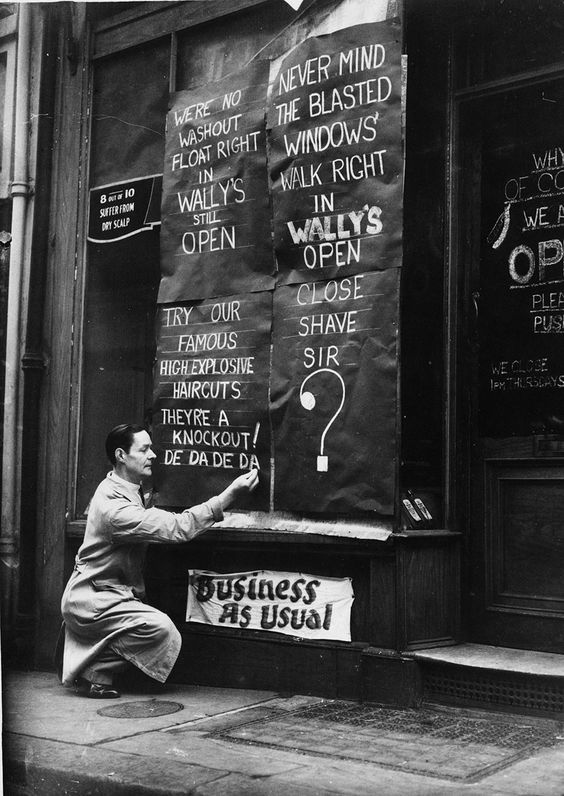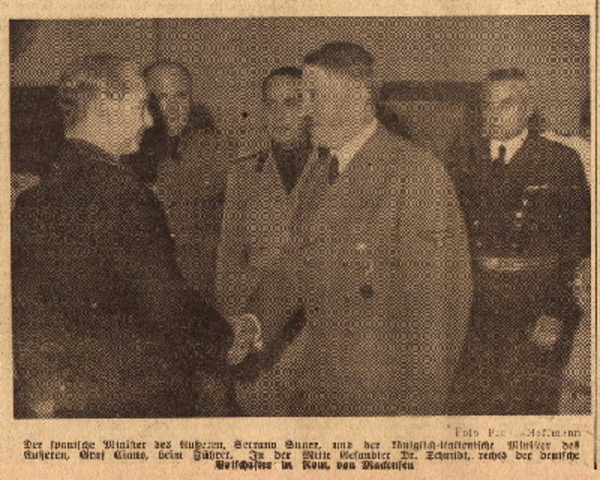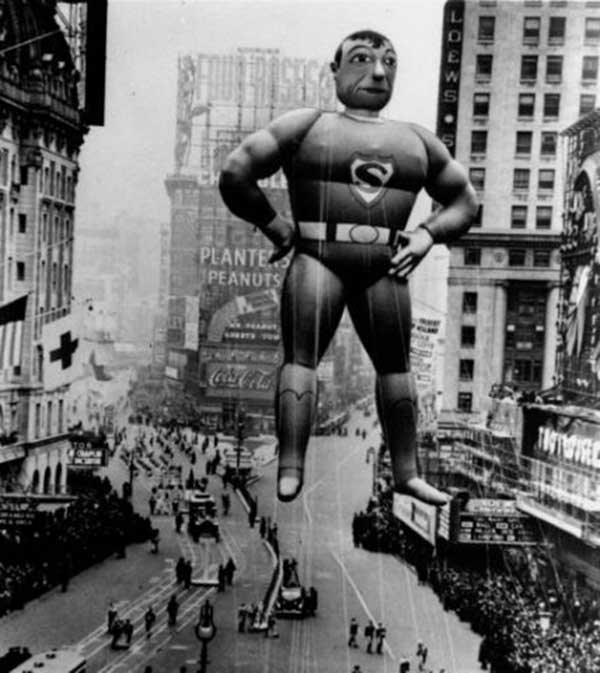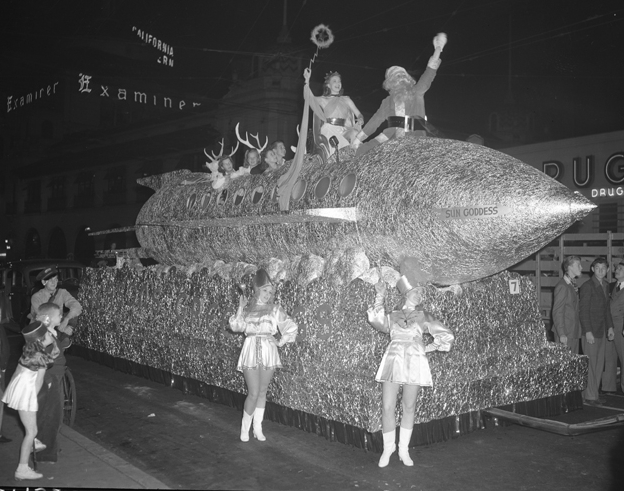Thursday 21 November 1940
 |
| Wally’s barber shop on St Martin Street remains open during the London blitz. 21 November 1940. |
Greek II Corps captures Ersekë.
Greek I Corps is reinforced with the 3rd Division. It is moving forward along the Gjirokastër–Tepelenë–Valona axis. Its objective is Valona, a major Italian supply port. Once the Greek K Group captures the city of Korçë, the main weight of the Greek offensive will shift to this line of attack.
Western Front: German 6th Army stages a simulated invasion of Ireland.
I,/JG 77 is redesignated IV,/JG 51 at Marquise.
Battle of the Atlantic: German cruisers Gneisenau, Scharnhorst, Köln, and Leipzig leave port for a breakout into the Atlantic shipping lanes.
German 375 ton coaster Birgitte Raabe collies with another ship about 33 km south of Utklippan, Sweden in the Baltic. The damage is too great, and the crew scuttles the ship.
British 6426 ton freighter Dakotian hits a mine and sinks off Milford Haven, Pembrokeshire. Everybody aboard survives.
U-103 (Kplt. Viktor Schütze) is on its second patrol out of Lorient. At 07:40, it spots Convoy OB 244 in the shipping lanes northwest of County Donegal, Ireland and fires three torpedoes. U-103 torpedoes and sinks 4768-ton British freighter Daydawn. There are 37 survivors and 2 deaths. The survivors are picked up by HMS Rhododendron.
U-103 also torpedoes and sinks 6085 ton Greek freighter Victoria in Convoy OB 244. Everybody survives, rescued by escort destroyer HMS Castleton.
U-103 attacks another freighter who tries to ram it, but the torpedo glances off the ship and does not explode. U-103 then has to break off the attack due to escort activity.
Corvette HMS Rhododendron responds to the U-103 attacks with a depth charge attack and claims to have sunk the U-boat. However, in fact, the submarine is undamaged - and apparently isn't even the U-103, but another U-boat stalking the convoy, U-104.
German 125 ton Kriegsmarine whaler Wespe NB17 sinks today of unknown causes.
Royal Navy 96 ton drifter Xmas Rose hits a mine and sinks in the Thames Estuary. There are four deaths.
Greek 4695 ton freighter Peleus hits a mine and is damaged at Milford Haven.
Convoy FN 339 departs from Southend, Convoy FS 341 departs from Methil, Convoy HX 90 departs from Halifax, Convoy BHX 90 departs from Bermuda, Convoy SL 56 departs from Freetown.
U-110 (Kapitänleutnant Fritz-Julius Lemp) is commissioned.
Battle of the Mediterranean: Royal Navy anti-submarine trawler HMS Lydiard attacks a submarine near Port Said but is damaged by its own depth charges and returns to port.
The RAF bombs Benghazi.
At Malta, there are two air raid alerts in quick succession early in the morning. In the darkness, a single Italian bomber flies across Malta and bombs the vicinity of the RAF airfield at Ta Qali. The night is cloudy, and the plane gets away.
 |
| Noel Coward with troops at the Grovely Camp in Brisbane. Taken from The Telegraph, 21 November 1940 |
Australian cruiser HMS Canberra is in pursuit of Pinguin. It knows the general location from radio messages received from another victim. The Canberra later picks up the passengers in the Port Brisbane's missing lifeboat.
Australian 5826 ton passenger liner Orungal runs aground at Barwon Heads, Victoria. The ship is salvageable, but ultimately catches on fire on 13 December and is written off.
Convoy US 7, carrying the Australian 26th Infantry Brigade, departs from Australia bound for Egypt.
Spy Stuff: The US House of Representatives' "Investigation of Un-American Propaganda Activities in the United States," better known as the Dies Committee after its chairman, Rep. Martin Dies, Jr., releases a 500-page White Paper. The White Paper examines German activities in the United States. It reveals that Manfred Zapp, head of the German Trans-ocean News Service, had been working to poison US/Japanese relations. The purpose was to divert US attention from the war in Europe in order to help the Germans. Another finding of the White Paper is that Germany has been engaging in a "Damned clever scheme" involving commercial relations in both North and South America.
There is an element of paranoia and overkill in this committee and its reports, as subversive German activities in the US actually are quite minimal. However, stoking such fears works in favor of increased assistance to Great Britain in its war against Germany, a covert policy of the Roosevelt administration (as exemplified by today's transfer of the final tranche of destroyers to Great Britain pursuant to the destroyers-for-bases deal). The Dies Committee remains in existence until 1944, never really accomplishing much of use beyond propaganda value of its own, when it morphs into another, broader investigative committee.
German/Romanian Relations: Adolf Hitler continues his succession of diplomatic meetings, meeting Romanian leader Ion Antonescu at the Reich Chancellory. Hitler apparently gives Antonescu a preview of Operation Barbarossa, still in its early planning stages.
Anglo/US Relations: The sixth and final tranche of US destroyers arrives at Halifax for transfer to the Royal Navy pursuant to the September destroyers-for-bases deal. The ships are:
- USS Bailey
- USS Meade
- USS Shubrick
- USS Swasey
- USS Claxton
- USS Fairfax
- USS Robinson
- USS Ringgold
- USS Sigourney
- USS Tillman.
 |
| Photos published on 21 November 1940 showing Hungary joining the Axis. Looking on are the Foreign Ministers of Spain (Serrano Suner) and Italy (Count Ciano). |
Then why not leave those vessels at Dakar and Casablanca where they now are? I shall keep them there and if there should be any change in this plan I will give you previous notice.This closes attempts by the Americans and the British (who are following along intently behind the scenes) to take possession of the ships.
British Military: British No. 2 Commando Battalion becomes the 11th Special Air Services Battalion. It now undergoes training as paratroopers.
British Government: It is the opening day of the new session of Parliament, and the King gives an address. He confirms that the Crown and its allies are committed to fighting against the aggressor nations until freedom is safe. Prime Minister Winston Churchill also gives remarks, revealing that the Greeks have pushed the Italians back across the Albanian border (though not everywhere yet). He also expresses confidence in the security of Egypt and the Suez Canal.
US Government: US Secretary for the Interior Harold Ickes gives a speech in New York which he excoriates national hero Charles Lindbergh, calling him:
one of America's leading fifth columnists, apparently representing small but dangerous groups of American-born Fascists.Lindbergh is a leading figure in the America First Committee, a peace group organized at Yale University. The America First position is that the US should stay out of foreign wars. The official US position also remains one of neutrality, making Lindbergh's stance in accordance with the government's own policies. However, Ickes reflects widespread sentiment in Democratic Party circles in favor of intervention, and they brand those advocating peace as traitors and foreign agents. Ickes' speech appears to be related to the release of the Dies White Paper.
Australia: The government raises taxes to pay for a vastly expanded war budget, which will consume 20% of spending.
This creates a bifurcated national celebration which predictably splits along political lines. Many people resent the government (even the saintly Roosevelt) meddling with the holiday schedule. Today, 32 states and the District of Columbia celebrate Thanksgiving, while 16 other states wait another week to celebrate, until the "Republican" Thanksgiving date. Today's celebration is given the derisive name "Franksgiving."
This is not one of Roosevelt's better ideas. A study of shopping patterns shows no appreciable increase in sales due to the earlier date. However, parades are mounted today in the largest states, as they were on the third Thursday of November in 1939.
Future History: Malcolm John "Mac" Rebennack is born in New Orleans. In his mid-teens, he meets Professor Longhair, a local artist. Professor Longhair takes a liking to Rebennack and teaches him the music business. At age 16, Rebennack is hired by Johnny Vincent at Ace Records as a producer. Rebennack becomes a fixture in local clubs, playing guitar and then the piano. Along the way, Rebennack changes his professional name to Dr. John, provides backing to top acts like Sonny & Cher, and reaches pop stardom in the 1970s. Dr. John is famous for hits like "Right Place Wrong Time" and has won six Grammy awards. He also has scored numerous popular films, such as Martin Scorsese's "The Last Waltz." Dr.John remains active in the music business with his band Dr. John and the Nite Trippers.
November 1940
November 1, 1940: Hitler Irate
November 2, 1940: U-31 Sunk - Again
November 3, 1940: Kretschmer's Master Class
November 4, 1940: Spain Absorbs Tangier
November 5, 1940: Jervis Bay Meets Admiral Scheer
November 6, 1940: San Demetrio Incident
November 7, 1940: Galloping Gertie
November 8, 1940: Italian Shakeup in Greece
November 9, 1940: Dutch Fascists March
November 10, 1940: Fala and Doc Strange
November 11, 1940: Taranto Raid
November 12, 1940: Molotov Takes Berlin
November 13, 1940: Molotov Foils Hitler
November 14, 1940: Moonlight Sonata
November 15, 1940: Warsaw Ghetto Sealed
November 16, 1940: France Keeps Battleships
November 17, 1940: Malta Hurricane Disaster
November 18, 1940: Hitler Berates Ciano
November 19, 1940: Birmingham Devastated
November 20, 1940: Hungary Joins Axis
November 21, 1940: Dies White Paper
November 22, 1940: Italians Take Korçë
November 23, 1940: U-Boat Bonanza!
November 24, 1940: Slovakia Joins In
November 25, 1940: Molotov's Demands
November 26, 1940: Bananas Be Gone
November 27, 1940: Cape Spartivento Battle
November 28, 1940: Wick Perishes
November 29, 1940: Trouble in Indochina
November 30, 1940: Lucy and Desi Marry
2020



No comments:
Post a Comment